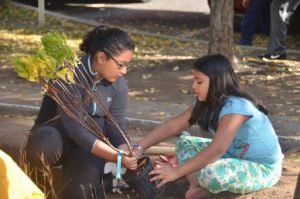A Rain Garden Grows in Harrison
At the first green infrastructure demonstration project in Harrison, Lou Lambe, president of the local Lions Club, told a group of volunteers, “This may seem like a small effort, but it is step in the direction we need to be taking for our future.” The two kidney-shaped rain gardens that the group planted at the foot of the public library can absorb a maximum of approximately 2,800 gallons of water per storm and as much as 38,000 gallons per year based on average rainfall.
Lambe is a member of Harrison TIDE (Transforming Infrastructure and Defending the Environment), whose goal is to improve the water quality and the quality of life of residents by addressing combined sewer and storm water pollution, flooding, and the need for economic development through identifying opportunities to implement green infrastructure, engage community members in educational programming, and public outreach. The group is a collaboration of the Town of Harrison, New Jersey Future, The Lions and Elks clubs, the Passaic Valley Sewerage Commission (PVSC), Rutgers Cooperative Extension (RCE) Water Resources Program, and the New Jersey Department of Environmental Protection.
Harrison TIDE spent the past couple of months reviewing the Town of Harrison’s Green Infrastructure Feasibility Study, which was developed in partnership with PVSC and the RCE Water Resources Program, to identify the town’s first demonstration green infrastructure project. TIDE identified the public library not only as an opportunity to redirect water that runs off the roof into the rain garden and away from the storm drains, but also to provide an ongoing educational opportunity to the many visitors to the library.
An estimated 23 billion gallons of raw sewage are dumped into New Jersey’s waterways every year as a result of combined-sewer overflows, when stormwater exceeds the amount that the sewage treatment plant can take from the town. The Town of Harrison is one of 21 towns in New Jersey that are in the process of developing Long Term Control Plans (LTCPs) that will reduce or eliminate combined-sewer overflows. These LTCPs are system-wide evaluations of sewer systems and plans to reduce overflows that are required by the New Jersey Department of Environmental Protection’s 2015 permit. Part of the process is for each town to evaluate alternative strategies that could be used to reduce overflows in the most cost-effective way. Green infrastructure installations such as rain gardens and tree trenches are alternatives that towns can use to help reduce storm-related overflows in combination with grey infrastructure like underground storage tanks and separating sewer lines.

The community came together to make this fist demonstration project a reality. Fields Construction Company, a local developer, provided the construction and labor. Rutgers Water Resource Center designed the gardens and led training for the community. Local elected officials and volunteers from Harrison Lions Club, Harrison Elks, the Environmental Clubs from Harrison High School and Washington Middle School, Harrison High School’s National Honor Society chapter, and Boy Scout Troop 305 joined Harrison TIDE partners to plant the rain gardens. The gardens were planted with native species that will attract wildlife and promote infiltration of stormwater from the library’s roof back into the ground, keeping it out of the sewer system.

The planting in Harrison was a hands-on learning experience for the volunteers who participated and will continue to be a visible demonstration of green infrastructure of the community. Green infrastructure projects can also raise property values and beautify neighborhoods at the same time that they help keep raw sewage out of the Passaic River.
For more information on Harrison TIDE visit: https://www.facebook.com/HarrisonTIDE/